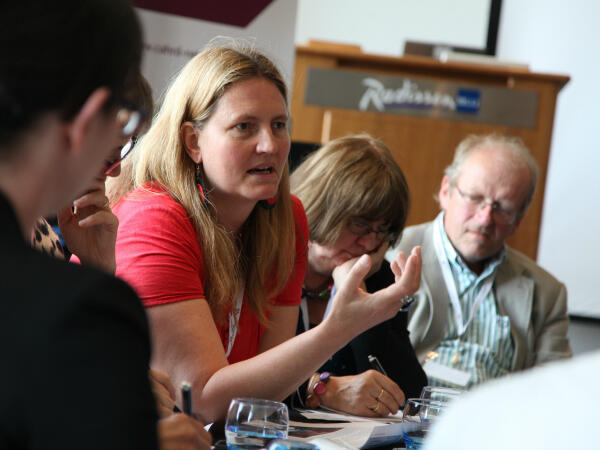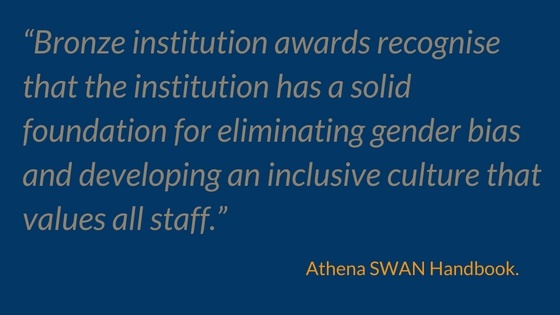
The Liverpool School of Tropical Medicine achieved an Institutional Athena SWAN Bronze Award in the November 2013 application round.

Clinical Sciences and International Public Health (CSIPH) has applied for a Faculty Athena SWAN Bronze award as evidence of our commitment to promoting equity and establishing an inclusive culture within our Faculty. We have established a Faculty Self-Assessment Team (SAT) which has been working hard on consulting with staff in the Faculty, exploring experiences of work-life balance, promotion, and perceptions of prevailing culture within the Faculty. The SAT team has produced an Action Plan based on staff consultation which, we believe, will contribute to ensuring that all colleagues in the Faculty are supported to reach their full potential.
Athena SWAN is based on ten key principles, which reflect the expansion of the Charter in 2015 to recognise (a) work undertaken in professional and support roles (and not only academic roles); (b) support for trans staff and students; (c) work carried out to address gender equality more broadly, and in all subject areas, and not just barriers to progression that affect women in STEMM; and (d) work carried out to explore the intersection of gender and other factors. Following this expansion, the team will initiate work to develop actions that address all staff in both our departments.
Faculty Athena SWAN Actions
Staff consultation highlighted certain themes which lead to the development of our 2016 action plan. Themes included promotion, support for colleagues on fixed-term contracts, dissemination of good line management practice, support for colleagues returning from maternity leave and mentoring. We are starting to see change in the Faculty based on our Athena SWAN activities the last few years, including for example a higher percentage of female colleagues at Professor, Reader and Senior Lecturer grade; an increase in female colleagues on permanent contracts; and an increase in number of staff taking paternity leave. We are delighted with this progress, though remain committed to ensuring that we continue to take action and monitor the impact of our activities.
Specific planned actions include:
• Establishment of a Line Managers’ forum to meet regularly to discuss good practice in terms of support for all staff, with a particular focus on part-time staff and colleagues returning from a career break.
• 100% of line managers will complete unconscious bias training by April 2018.
• New £1,000 fund to support the upcoming Athena SWAN well-being and awareness events to enhance inclusivity within the Faculty (in collaboration with the Faculty of Biological Sciences)
• AS activities to be embedded in Faculty awaydays.
• Colleagues returning from a career break will be encouraged and supported to apply for central and departmental funds to help them re-engage with their research.
• Development of an interactive webspace for colleagues on fixed-term contracts and PhD students, to improve communication, share knowledge and provide sources of information including funding opportunities.
• Promote awareness of paternity and shared parental leave
• New £1,000 Faculty Keeping In Touch (KIT) day fund to cover childcare costs for colleagues on maternity leave attending KIT days.
• Compilation of a list of KIT day activities women have found useful in the past for line managers to discuss at parental leave meetings and line managers’ forum.
• Development of suite of actions to support staff in the Faculty who live overseas and who travel frequently
• All staff will have access to new central mentoring scheme.
Research and Gender Equality in our Faculty
There is much to celebrate in terms of gender equality activity within the Faculty, both to promote an inclusive working environment at work, but also in terms of research on gender equality issues internationally. For example, Dr Rachel Tolhurst, identified funding for a PhD studentship under the DELTAS Africa Learning Research Programme, led by Dr Imelda Bates at LSTM, in partnership with the Alliance for Accelerating Excellence in Science in Africa (AESA), AFIDEP (African Institute for Development Policy), Kenya and the Pasteur Institute, Paris. The title of the research project is Examining barriers and enablers to gender equitable scientific career pathways in African research institutions. Millicent Liani has been recruited to conduct this PhD research and will be based in Kenya.
Professor Sally Theobald is part of RESYST (Resilient and Responsive Health Systems), an international research consortium that conducts health policy and systems research in Africa and Asia to promote health and health equity and reduce poverty. The new consortium initiative Research in Gender and Ethics (RinGs) aims to understand how gender and ethics interface with health systems. Professor Theobald presented on a panel during the World Health Assembly in Geneva on Health Systems Strengthening: Women’s Leadership, Peace and Security in June 2016. The focus of her presentation was work from Building Back Better on gender and health systems in post conflict contexts. Following a formal partnership between RinGs and Women in Global Health, Sally is presenting in the World Health Summit in Berlin in October on women’s leadership in global health. Rachel Tolhurst and Laura Dean presented findings of an MRC-funded exploration of the drivers of child marriage at a national dissemination meeting in Sudan.